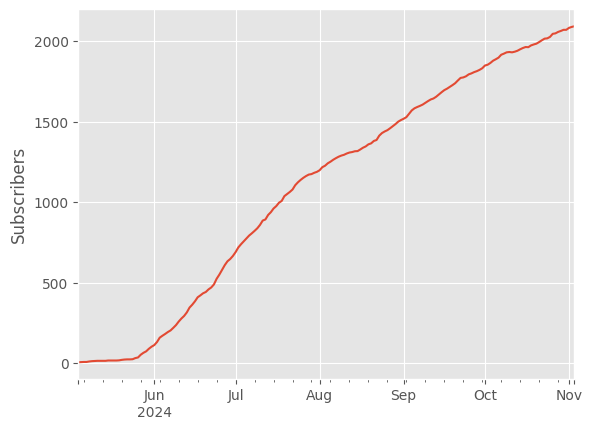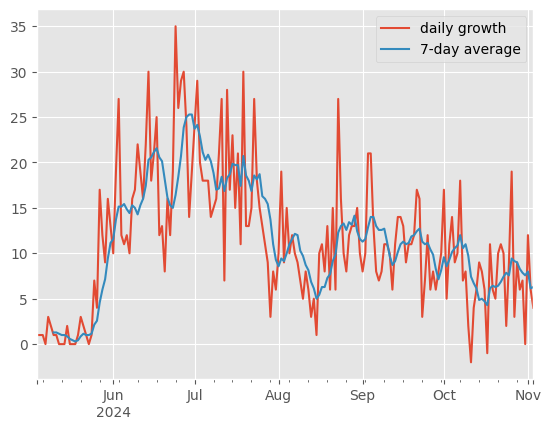State of the Wonderland: Q2
The second quarterly check-in on how Cognitive Wonderland is doing
Previous States of the Wonderland:
It's officially been 6 months since Cognitive Wonderland started. Just like I did at the end of the first quarter of the publication, I wanted to share some reflections. This is a sort of "special issue" that I won't be emailing out.
I'll cover some stuff I read over the past quarter that's stuck with me, some experiments I engaged in, stats and reflections on growth, and an update about how I'm thinking about the future of the publication.
Recommendations
Let me start with some stuff I read that's stuck with me. I'm using the same format as last time: recommending one Substack Publication, one Substack post, a non-fiction book, and a fiction book.
Substack Recommendation: by
Gunnar is an incredible writer. His prose is eloquent and playful, and his range of topics is incredible: Subtle Sparks covers everything from sex bots to spiders and the meaning of life. But I don't think I've seen another publication play around so much with format. Gunnar is an accomplished fiction writer, and brings that creativity to his non-fiction writing, leading to a lot of fun articles. You never quite know what you're going to get with the next post from Gunnar, which is part of what makes me value the publication so much.
Substack Post Recommendation: Personal Ties to Causes Don't Matter on
In this post,
argues that our personal ties to a cause, well, don't matter. I guess that was obvious from the title. What he means is that us being affected by a particular issue doesn't make that issue more morally important, and instead we should think of the generalization of that issue. Connor has some experience with this—his father died at the young age of 57 from a preventable heart condition. But how he thinks of this is really interesting:"I try not to think of it in terms of my dad dying from bad heart health. I instead think that he died of death."
This line has stuck with me. It's a reminder that we can always generalize from the specific instance to something bigger, to broaden our empathy for a wider range of issues. Whether you agree or not, it's an interesting framing of the issue that's stuck with me.
Fiction book: Programmed Hearts: Stories of Robots and AI
This is a fun little book of drabbles (100-word stories). It's extremely short—it has 60 stories in it, which puts it at 6000 words, about the length of many short stories. The stories are all science fiction stories featuring AI or robots that range from humorous to profound.
Non-fiction book: The Big Picture: On the Origins of Life, Meaning, and the Universe Itself by Sean Carroll
I picked this up after hearing Sean Carroll on a podcast and thinking he was worth listening to. I walked away with a pretty profound respect for Carroll—he's a theoretical physicist (a pretty accomplished one), but has clearly been spending a lot of time around philosophers and has started publishing articles regularly in philosophy journals. On top of that, Carroll is a great communicator—his writing reads extremely clearly. The Big Picture is, as the title suggests, a wide-ranging book, covering metaphysics, epistemology, philosophy of mind, and more. Carroll argues for a naturalist worldview with clarity, and while I don't agree with everything he says, reading it gave me a sharper understanding of my own views and new ways to articulate them.
Experiments this quarter
This quarter I did a ton of collaborations. This was all new to me.
I did "Tune Tag" with
, a fun opportunity to talk about music a bitI wrote a guest article for
on my advice for getting traction on Substack based on my Q1 successI made my first ever podcast appearance by going on the
show, and talked a bit about AII had a chat with
about consciousnessSimilarly, I had a conversation with
about consciousnessI talked to
about leaving academic philosophy
These were fun experiences—connecting with other members of the community in a new way and participating in a different form of creation than my usual articles.
They were also opportunities to reach a different audience and foster a connection with a fellow Substack author.
I'll definitely be doing more in the future, but probably not at the same rate (doing 6 over a 3 month period is a lot!).
I was a bit surprised they didn't seem to lead to more growth. They definitely led to a few subscriptions, but it was a small handful. My learning from this is collaboration isn't exactly a growth hack, it's something to do if it sounds fun.
Another experiment I tried this quarter was publishing some posts without emailing them out (for example, the last quarterly review, and my conversation with Connor). Overall this was successful—it allowed me to publish some content without risking losing subscribers by emailing them, and those posts have done okay (not getting anywhere near the engagement of my main posts, but that's expected). For topics that might not interest my usual readers, it's a nice option to have.
Stats
Growth slowed considerably in my second quarter on Substack.
I ended the first quarter with 1227 subscribers, almost all of which was gained in my second and third months here (June and July). As of my 6 month anniversary, I have 2094.
Looking at the plot over time, you can see a bit of a kink in the graph showing slower growth in the second quarter:
This is more stark looking at day-over-day subscriber growth:
June and July were far above average, and then August was slow. September picked up a little, October was a bit slow again.
I have a pretty good idea of what caused the variance within the August-October timeframe (the valleys are periods where I was on vacation and not as active on Notes, the peaks are usually either having a Note that had some traction or a collaboration that led to some extra subscribers).
But what caused the big difference between July and August?
I'm not sure.
Maybe there was an algorithm change, maybe I was unknowingly getting a bump from something hidden to me from June-July, maybe there was some well-aligned audience that formed a dense network that I saturated on. It also could be that I had three “hit” articles in Q1 that punched far above their weight for the size of my publication at the time (turns out writing about god, doomerism, and free will gets a lot of attention).
I have to admit, August was a hard month. My growth fell by ~75% for a bit and I didn't know why. That forced some reflection.
I'm still growing steadily, and I have a pretty large audience now. But the rocketship growth has stopped. My paid subscriber growth is even worse (went from 9 to 13 in the last quarter—and one of the new ones is my mom). This newsletter isn't going to be paying the bills anytime soon unless I change something.
And I'm not going to change something.
Reflecting on the change in trajectory brought me back to why I'm on Substack to begin with: to force myself to explore and articulate ideas. Having the positive feedback of an audience is great because it motivates me to keep going. If I was writing into the void, I'm not sure I would have continued at this pace for this long.
The audience I have is amazing. Every post I put up gets feedback and spurs conversations and thoughts. Having this platform, even if it wasn't growing at all any more, would be something incredibly valuable.
I don't want to spend my limited time and energy trying to build up paid subscribers. And the slower growth in subscribers overall is fine—if there was some easy way to increase it, I would do it, but I don't want to spend my energy (or money) on trying to increase growth further.
I'm going to continue to focus on the content. I have plans in mind for the future, but the "bigger picture" I'm building towards isn't just a bigger audience. It's having a better articulation and clarity around my ideas. Other things will come from that naturally.
Topics
It's kind of interesting the natural clustering of topics I talk about. Q1 (leaking a bit into Q2) I talked a lot about epistemology or epistemology-adjacent topics, with my "Reality Filters" series (1, 2, 3) and the posts about concepts and empty ideas in philosophy (1, 2, 3, 4, 5).
Q2 there was more of a focus on consciousness (1, 2, my conversations with Connor and Bentham’s Bulldog, even my fiction story, Rest in Virtual).
Q3, I want to get back to what made me want to start writing in the first place: the concept of cognitive wonder. I've written about this a bit (in my inaugural post and more recently in talking about curiosity). But there's more there I want to articulate. What it means to understand something, the relationship between science and philosophy, emergence and reduction—exploring these and their relationship to a feeling of wonder about understanding the world is where I want to go next.
We'll see where it takes us.







Those are fascinating topics you are planning for Q3! Looking forward to reading your thoughts.
2000 after 6 months is nuts, but it's also easily explained - you write good stuff! Should be really proud of yourself, well done man